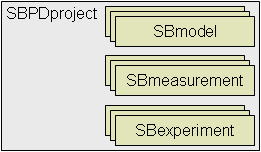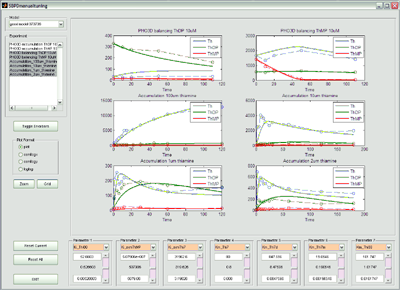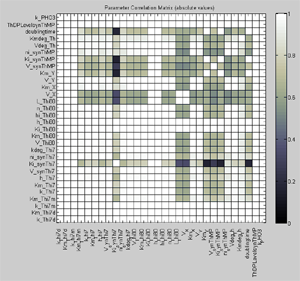Overview and Features of SBPD
| The SBPD extension package (SBPD) for the Systems Biology Toolbox 2 adds high-speed simulations, combination of models, experiments, and measurement data in so called projects. Functions are available that support the complete model building process (modeling, simulation, identifiability analysis, model reduction, parameter estimation (multiple experiment and multiple measurement fitting), validation, etc.). The projects are a powerful construct that allows to keep a perfect overview over your modeling task at any time. Graphical user interfaces support the workflow. |
Main Features SBPD
|
Project Representation
 Projects combine models, experiments, and measurements and allow you total control over your modeling projects.
Functions, such as manual parameter tuning, parameter estimation, model reduction, identifiability analysis, etc.
can directly be applied to such projects.
Projects combine models, experiments, and measurements and allow you total control over your modeling projects.
Functions, such as manual parameter tuning, parameter estimation, model reduction, identifiability analysis, etc.
can directly be applied to such projects.
High Performance Simulation
For parameter estimation purposes the simulation speed is of crucial importance. Therefor, the SBPD package does not rely on the standard integrators and compilers that are inbuild in Matlab. Instead the simulations are performed by converting models to C-code and using the CVODEs integrator package from SUNDIALS. The benchmark ODE15s vs. SBPD shows that due to that the simulation performance increases by a factor somewhere between 30 and 150.
Manual Parameter Tuning
 The manual parameter tuning function allows you to change parameter values and displays the results of the insilico experiments that are defined in the project
in realtime. This is a very valuable function for getting an insight into the effect of different parameters and a good way of giving a model its finally
accepted parameter settings.
The manual parameter tuning function allows you to change parameter values and displays the results of the insilico experiments that are defined in the project
in realtime. This is a very valuable function for getting an insight into the effect of different parameters and a good way of giving a model its finally
accepted parameter settings.
Parameter Estimation
Parameter estimation can be applied directly to a project. Any optimization method that is available in MATLAB can be used. However, to be independent of the Optimzation Toolbox several local and global optimization methods are available in the SBTOOLBOX2. The parameter estimation functionality in SBPD automatically takes care of multiple experiments and multiple datasets in your projects.
Identifiability Analysis
 Prior to performing parameter estimation it is a good idea to assess the identifiability of the models parameters. Otherwise the estimation might return
unreliable results. Identifiability of parameters depends on the structure of the model, but also on the experiments that have been performed and the
components that have been measured. The SBPD package contains functionality to directly apply identifiability analysis to projects.
Prior to performing parameter estimation it is a good idea to assess the identifiability of the models parameters. Otherwise the estimation might return
unreliable results. Identifiability of parameters depends on the structure of the model, but also on the experiments that have been performed and the
components that have been measured. The SBPD package contains functionality to directly apply identifiability analysis to projects.
Model Reduction
Models of biochemical systems are usually highly overparameterized with regard to the available measurement data. This renders the parameter estimation task difficult due to indentifiability issues. One possibility is to reduce a models complexity. The SBPD package contains model reduction functionality that can directly be applied to a chosen model in a project.
Additional Features
Additionally, the SBPD package contains many auxiliary functions that are useful for facilitating the access to projects or data elements, writing own scripts, and last but not least to make it independent of other commercial MATLAB toolboxes and third party packages. However, for just a few function the presence of the Symbolic Toolbox is required.
Documentation
| Section | Description |
|---|---|
| User's Reference | Complete SBPD user's reference guide. All functions of the package are explained in detail and by examples. |
| Benchmark | Benchmark between SBPD simulation and standard MATLAB simulation using ODE15s. |

